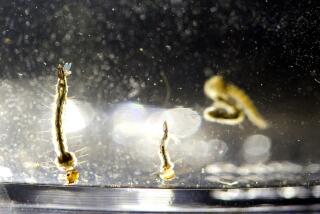Scientists Seek to Develop Generation of ‘Superpigs’
- Share via
ATHENS, Ohio — It’s not nice to fool Mother Nature, but Tom Wagner is doing it every day of the week.
The Ohio University zoology professor is using “designer” genes to make pigs grow up to three times faster than normal, and he has planned a way to bottle genetic material for sale to farmers, who will then inject their own animals to enhance their qualities.
On the horizon, Wagner sees the day when animals can be programmed to produce insulin, virus-fighting interferon and enzymes for industrial use, along with their normal proteins.
Wagner heads a group of two dozen scientists and technicians specializing in molecular and cellular biology at the university.
The team removes embryos from pregnant mice, rabbits and pigs, and under high-powered microscopes, the scientists isolate, splice and transplant gene “regulators”--the tiny parts of genes that give instructions for various traits.
The gene regulator is a piece of the deoxyribonucleic acid (DNA) in a chromosome, which is inside the nucleus of a single microscopic cell.
Depends on Hormones
Growth of an animal is dependent upon production of growth hormones. If the hormones can be produced all the time, instead of just during the normal growth period, an animal will grow quickly and constantly.
So Wagner’s job is to find a regulator that will turn the growth gene on and keep it on.
Wagner, 43, is not some mad scientist manipulating test tubes and smouldering beakers to create a generation of “superpigs” that will take over the world, although he has been called “the guy who made the big mice.”
“I guess I’d rather be known as the guy who made the big mice rather than the guy who made the big pigs,” said Wagner, the fifth generation descendant of a central Ohio farm family.
“Why make a better animal?” asks Wagner. “Our agricultural animals are not doing what they were meant to do.” That is, cows ought to give milk all the time and chickens ought to yield more white meat.
Through animal biotechnology, Wagner hopes to provide farmers with dream animals, all without having to feed them anything special.
If you’re a hog farmer and you get some pigs treated with fast-growth regulators, you will double the number of hogs you can take to market in a year, sharply cut feed costs and make more economical use of your barns. Thus you can pay off debt faster on buildings and equipment.
Produces Better Pork
For the consumer, the quick growth means pork with less fat and cholesterol. The National Pork Council is highly interested in Wagner’s project.
But Wagner wants to go a step further and help agribusiness and the rest of the economy. Transgenic animals have a limited market value, so he’s working on a way to bypass the breeding step and sell the desirable genetic material in bottles.
Wagner envisions a whole new animal pharmaceutical industry.
Farmers could inject their animals, only once, with a “package” of DNA, which would travel to the blood tissue or bone marrow and produce a protein with the desired trait, such as rapid growth.
Wagner points out that the Japanese already have engineered silkworms to produce interferon along with silk.
The economic implications of this “genetic delivery” system are not lost on Ohio’s state government, which has designated Wagner’s project as one of six Advanced Technology Application Centers in Ohio and is pumping more than $3 million, plus $4 million in federal funds, into the research.
More to Read
Sign up for Essential California
The most important California stories and recommendations in your inbox every morning.
You may occasionally receive promotional content from the Los Angeles Times.










